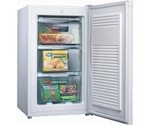Best price (by far) that I can find for adding to freezer space and stocking up on bulk items (ie. meat, homemade babyfood!)
Pretty much the same 82 litre "China Fridge" is $221 at Good Guys. Branded model your talking $349…
If anybody finds a better deal let me know.
If your looking for something larger these are the best deals I could find (all posted to VIC, other states will be cheaper as most onlines are NSW based)
2nds World http://www.2ndsworld.com.au/
CHANGHONG - 200L Chest Freezer $407 (New, Carton damaged) <—- best deal
CHANGHONG - 150L $303 (New)
Appliances Online http://www.appliancesonline.com.au/chest-freezers.aspx
164L Fisher & Paykel - $404
148L Haier Chest Freezer - $346
Good Guys http://www.thegoodguys.com.au
Hisense 205 litre - $449 ($399 pickup)




Beware the energy cost on these cheap freezers!
Compare the (estimated) Annual Energy Consumption on the labels - mutlipy the difference by 25c per kWh and you'll see the benefits of buying a higher priced but more efficient model.